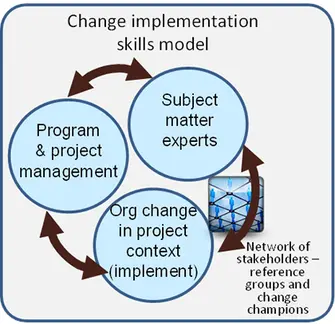The key to successfully implementing change is to have the right people, with the right combination of knowledge, skills and experience, in the right roles. The following model is one I have used successfully when considering the resourcing of implementation project leadership groups and project teams.

This fundamental mix needs to be in place for every change project.
Large, complex and/or transformational change projects should have a leadership team that incorporates each of these specialist professions through the use of multiple, experienced leaders working collaboratively together.
For smaller, simpler projects, a single leader can cover all elements even if they are not highly experienced in each, as long as the fundamental skills and specific areas of focus are each covered off through team members within the project.
Subject matter experts
The subject matter experts in the leadership and/or project team should represent the major stakeholder groups impacted by the change in the context of their specialist knowledge and skills. The team should include people from within the business who have a strong knowledge of the organisation, including its products/services and processes, and which people in the organisation have specialist knowledge and strong influence. It is also important for all projects to consider corporate services specialisations such as finance, procurement, asset management, information and communication technology and human resources, even if in a part-time but formal role.
Subject matter experts on the project need to either represent all major specialisations impacted, or be strong relationship managers with those key representatives.
Program and project management
Program and project management is a specialist profession, where experience, more than theoretical knowledge, is an important ingredient in successfully implementing change, realising benefits and embedding a new way of operating into normal business activity. Without successful implementation project leadership experience, it is easy to design theoretical solutions that are difficult to implement in practice – “the devil is in the detail”. Professional program and project directors provide leadership and facilitate development of tailored approaches in partnership with subject matter experts and organisational change management implementation professionals. They drive the change effectively for faster implementation. Project managers provide management support.
Large, complex and transformational change projects need to have an experienced implementation project director as part of the leadership team, bringing a balance between applying and tailoring a methodology to cost effectively drive change and minimise management overhead.
Smaller, simpler projects can use a less experienced project manager to provide project management guidance and support to the project.
Related articles
Organisational change management in the context of implementation projects
Organisational change management is a specialist profession, and in particular, the implementation of transformational change is a particular specialisation. The scope of strategic leadership provided by experienced project based organisational change management professionals goes well beyond the individual activities of communications, training and organisational values and culture. These elements are important but are only a part of the requirements to implement major or transformational change for the organisation and through its teams and individual staff.
For large and complex change projects, it is critical to engage an experienced implementation project organisational change management professional to work as part of the leadership team. A strong and practical professional in this area will develop detailed business preparation, sponsorship support, resistance management, engagement, communications, training and other activities that will enable leaders, teams and individuals to implement the changes applicable to their day to day roles.
For smaller projects that effectively enhance or streamline existing business processes and products/services, where the changes will be relatively straight forward for all stakeholder groups to grasp and support, a specialist may not be required. Instead, having a strong relationship manager and good communicators (verbal and written) in the team may be sufficient to manage a “straight forward” change, supported by in-house human resources, communications and training teams. Even without the specialisation, it is important to have one or more project team member(s) focussed on the stakeholder impacts, communications and preparation elements of implementing change.
Related article
